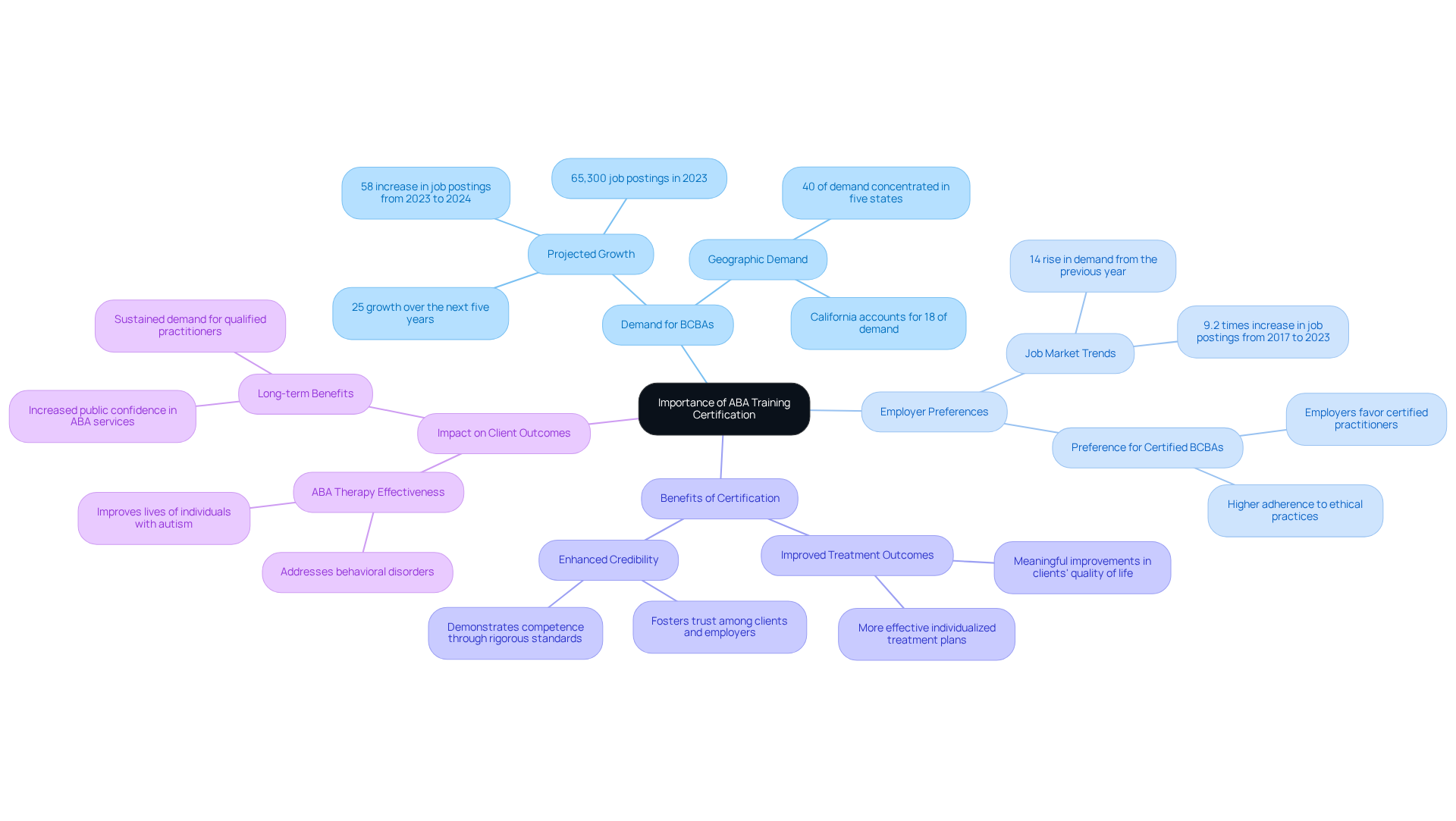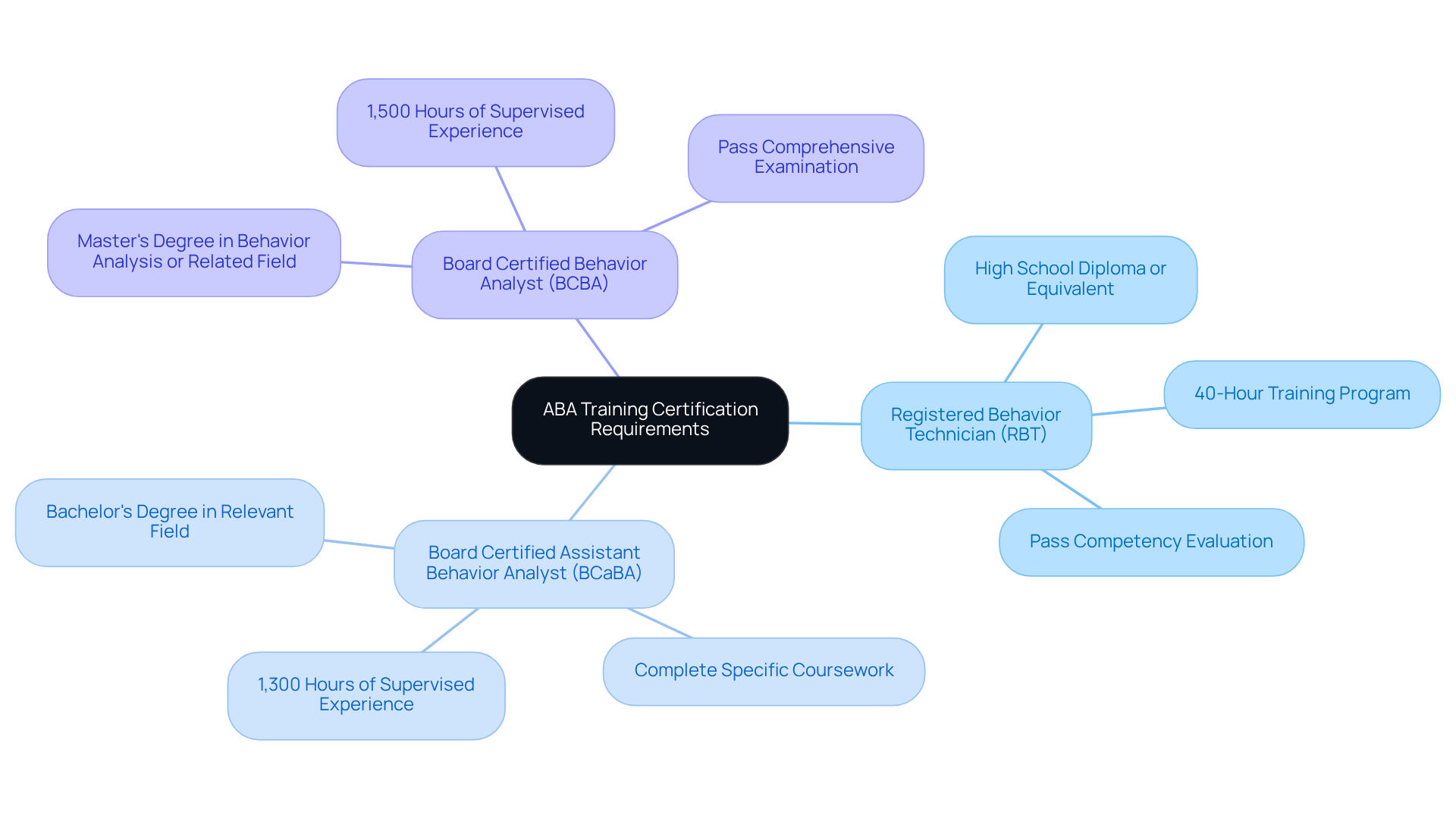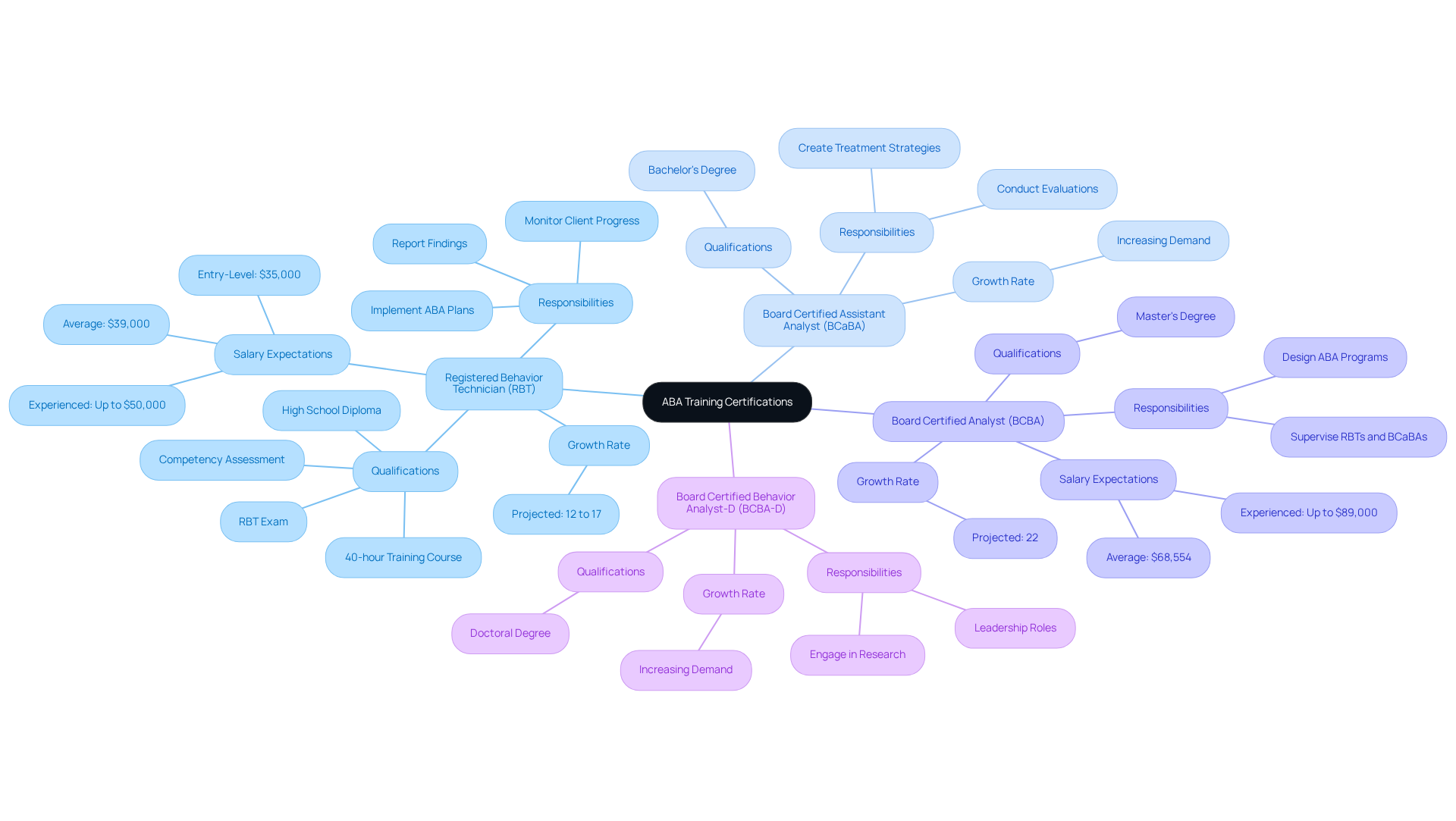August 27, 2025

The article underscores the critical importance of ABA training certification, particularly in light of the growing demand for Board Certified Behavior Analysts (BCBAs). Recent statistics reveal a significant increase in job postings for behavior analysts, highlighting the urgent need for qualified professionals in this field. Certification not only ensures competency among behavior analysts but also plays a vital role in enhancing the quality of care provided to clients. It is imperative that professionals meet the structured criteria established for various certification levels, including:
As the demand for skilled behavior analysts continues to rise, organizations must prioritize hiring certified professionals to maintain high standards of care. Are you facing challenges in finding qualified candidates? Consider how utilizing a dedicated recruitment platform like Hire ABA can streamline your hiring process and connect you with the best talent in the industry.
In conclusion, the significance of ABA training certification cannot be overstated. It is essential for both improving care quality and addressing the increasing demand for skilled professionals in the field. By prioritizing certification, organizations can ensure they are equipped with the expertise necessary to provide exceptional care.
The growing demand for Board Certified Behavior Analysts (BCBAs) highlights the essential role of ABA training certification in today’s behavioral health landscape. This certification not only validates practitioners' expertise but also guarantees that they possess the skills necessary to implement effective interventions for individuals facing behavioral challenges.
As the need for qualified behavior analysts continues to rise, one must consider:
Reflecting on these questions is crucial for those looking to excel in the realm of behavioral analysis.
The surging demand for Board Certified Behavior Analysts (BCBAs) highlights the critical importance of ABA training certification. This formal recognition, granted by the (BACB), acknowledges individuals who meet the rigorous educational and practical requirements in Applied Behavior Analysis (ABA). The credential encompasses various tiers, including:
Each level necessitates specific prerequisites, such as educational qualifications, supervised experience, and the successful completion of an assessment exam. Notably, the overall pass rate for this exam ranges between 60% and 70%, illustrating the challenges candidates face in achieving qualification.
This structured approach establishes a benchmark for competency and reinforces ethical practices within the field of ABA. It ensures that practitioners are well-equipped to implement effective interventions for individuals facing behavioral challenges. Recent updates from the BACB reveal a growing number of certified professionals, reflecting the increasing demand for qualified behavior analysts.
As Alan Hollander emphasizes, BCBA qualifications guarantee that behavior analysts possess the essential knowledge and skills to deliver effective and ethical behavior analysis services. The influence of ABA training certification on practitioner effectiveness is substantial; it enhances the quality of care offered to clients and fosters trust within the community. Are you facing challenges in hiring qualified behavior analysts? Consider how the right recruitment platform can address these issues and ensure you have the best professionals on your team.
![]()
The demand for Board Certified Behavior Analysts (BCBAs) is surging, with a projected growth of 25% over the next five years. This statistic underscores the , which plays a crucial role in the field. The ABA training certification ensures that practitioners possess the necessary knowledge and skills to implement effective ABA interventions, which are essential for improving the lives of individuals with autism and other behavioral disorders. Employers overwhelmingly prefer certified BCBAs, as these professionals have demonstrated their competence through rigorous standards. This preference is illustrated by a remarkable 58% increase in job postings seeking individuals with BCBA credentials from 2023 to 2024, highlighting the growing demand for certified practitioners.
Moreover, accreditation enhances the credibility of professionals, fostering trust among clients and employers alike. A significant percentage of employers recognize that certified practitioners are more likely to adhere to ethical practices and accountability, vital for maintaining the integrity of the ABA profession. Case studies reveal that certified BCBAs are often more effective in developing individualized treatment plans, leading to meaningful improvements in clients' quality of life. These real-world applications emphasize the tangible advantages of credentialing in practice.
As the demand for qualified BCBAs continues to rise, obtaining an ABA training certification becomes increasingly vital for upholding high standards of care and instilling public confidence in ABA services. In this evolving landscape, the role of credentials in enhancing professional credibility and ensuring effective treatment is critical, as evidenced by the increasing number of job opportunities. Are you staying informed about new opportunities in this booming market? Now is the time to consider how your credentials can open doors to new possibilities, allowing you to explore leadership and remote roles that enable you to influence more lives while advancing your career.

The criteria for vary significantly based on the level of accreditation pursued. Notably, for the Registered Behavior Technician (RBT) certification, candidates must:
In contrast, candidates for the Board Certified Assistant Behavior Analyst (BCaBA) are required to:
At the pinnacle of certification, the Board Certified Behavior Analyst (BCBA) certification demands:
Each certification level underscores the necessity of ongoing professional development to uphold credentials and remain abreast of best practices in ABA training certification. Furthermore, behavior analyst candidates must fulfill 32 continuing education units (CEUs) every two years.
Recent statistics reveal that the average wage for RBT roles hovers around $24 per hour, reflecting the competitive nature of the job market. Additionally, historical data indicates a concerning decline in passing percentages for BCBA candidates, dropping from 66% in 2020 to 54% in 2024, which highlights the challenges faced by test-takers. It is essential for candidates to engage with all content areas for the examination; focusing solely on weaker areas may impede overall understanding. Are you prepared to navigate these challenges in your hiring process? Consider how Hire ABA can streamline your recruitment efforts and connect you with qualified candidates.

In the realm of Applied Conduct Analysis (ABA), the demand for Board Certified Behavior Analysts (BCBAs) is surging, with a projected growth rate of 22% from 2016 to 2026. This statistic underscores the increasing need for qualified professionals in the field, making the essential for aspiring practitioners to understand the various training qualifications that address different levels of expertise and responsibilities.
Every qualification level is essential for providing effective ABA training certification services, ensuring that practitioners possess the necessary skills to meet the diverse needs of their clients. As the demand for ABA therapy continues to rise, understanding these certifications becomes increasingly important for aspiring professionals. Are you facing challenges in hiring qualified ABA professionals? Consider how Hire ABA can streamline your recruitment process and connect you with the right talent.

The demand for Board Certified Behavior Analysts (BCBAs) is soaring, underscoring the critical importance of ABA training certification as a benchmark for competency in Applied Behavior Analysis. This formal recognition not only validates practitioners' qualifications but also ensures they are fully equipped to deliver effective interventions for individuals facing behavioral challenges. As the need for certified professionals continues to rise, understanding the various certification levels and their requirements is essential for those aspiring to enter this rewarding profession.
Key points have been addressed throughout this article, including the structured tiers of certification—from Registered Behavior Technicians (RBTs) to Board Certified Behavior Analysts (BCBAs)—along with the rigorous educational and practical prerequisites necessary for each level. The burgeoning job market, marked by a significant increase in demand for certified professionals, highlights the vital role these qualifications play in enhancing the credibility and effectiveness of ABA practitioners. Moreover, the emphasis on ethical practices and accountability reinforces the necessity of maintaining high standards within the profession.
In light of the increasing need for qualified behavior analysts, it is crucial for aspiring professionals to actively pursue ABA training certification. This journey not only opens doors to career advancement and leadership opportunities but also contributes to the overall improvement of care for individuals with behavioral challenges. Embracing the path to certification transcends personal growth; it is about making a meaningful impact in the lives of others. As the landscape of ABA continues to evolve, staying informed and committed to professional development will ultimately foster a more effective and trusted community of behavior analysts.
What is ABA training certification?
ABA training certification is a formal recognition granted by the Behavior Analyst Certification Board (BACB) to individuals who meet the educational and practical requirements in Applied Behavior Analysis (ABA).
What are the different tiers of ABA training certification?
The different tiers of ABA training certification include Registered Behavior Technician (RBT), Board Certified Assistant Behavior Analyst (BCaBA), and Board Certified Behavior Analyst (BCBA).
What are the prerequisites for obtaining ABA training certification?
Prerequisites for obtaining ABA training certification include specific educational qualifications, supervised experience, and successfully completing an assessment exam.
What is the pass rate for the ABA certification exam?
The overall pass rate for the ABA certification exam ranges between 60% and 70%.
Why is ABA training certification important?
ABA training certification is important as it establishes a benchmark for competency, reinforces ethical practices, and ensures that practitioners are equipped to implement effective interventions for individuals facing behavioral challenges.
How does ABA training certification impact practitioner effectiveness?
ABA training certification enhances the quality of care offered to clients and fosters trust within the community by ensuring behavior analysts possess the essential knowledge and skills to deliver effective and ethical behavior analysis services.
What recent trends are observed regarding certified behavior analysts?
Recent updates from the BACB indicate a growing number of certified professionals, reflecting the increasing demand for qualified behavior analysts.
Our expert recruitment strategies and AI-driven sourcing ensure that you receive top-notch candidates quickly, without compromising on quality. Whether you’re looking for BCBAs, Clinical Directors, or RBTs, we’ve got you covered.